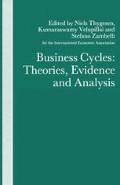Abstract
Friedman and Schwartz’s work on the monetary history of the USA, especially the evidence presented in ‘Money and Business Cycles’(1963) had a profound impact on our views on the American economy. Their work drew attention to the need for similar studies of other countries. But surprisingly no long-period study of the cycle after 1870 was ever carried out for Britain. Even more surprisingly in the latest and avowedly quantitative economic history textbook on Britain (Floud and McCloskey, 1981) there is no chapter on money. There is a brief dismissal of the role of money in the cycle.
Access this chapter
Tax calculation will be finalised at checkout
Purchases are for personal use only
Preview
Unable to display preview. Download preview PDF.
References
Aldcroft, D. and Fearon, P. (1972) British Economic Fluctuations, 1790–1939 (London: Macmillan).
Barro, Robert J. (1977) ‘Unanticipated Money Growth and Unemployment in the United States’, American Economic Review, pp. 101–15.
Barro, Robert J. (1978) ‘Unanticipated Money, Output and the Price Level in the United States’, Journal of Political Economy, pp. 549–80.
Barro, Robert J. (1984) Macroeconomics (Chichester: Wiley).
Beveridge, W. H. (1939) ‘Unemployment and the Trade Cycle’, Economic Journal, vol. XLIX.
Bordo, Michael D. (1986) ‘Explorations in Monetary History: A Survey of the Literature’, Explorations in Economic History, vol. 23.
Britton, Andrew (1986) The Trade Cycle in Britain, 1958–82 (Cambridge: Cambridge University Press).
Capie, Forrest and Mills, T. C. (1989) ‘Money and Business Cycles in the US and UK, 1870-1913’(mimeo).
Capie, Forrest and Webber, Alan (1985) A Monetary History of the United Kingdom, 1870–1982: Data Sources and Methods (London: Allen & Unwin).
Capie, Forrest and Wood, Geoffrey (eds) (1986) Financial Crises and the World Banking System (London: Macmillan).
Collins, Michael (1988) English Banks and Business Cycles, 1848-80’in Cottrell and Moggridge (1988).
Coppock, D. J. (1972) ‘The Causes of Business Fluctuations’in Aldcroft and Fearon (1972).
Corner, D. C. (1956) ‘Exports and the British Trade Cycle, 1929’, Manchester School, vol. XXIV.
Cottrell, P. and Moggridge, D. (1988) Money and Power (London: Macmillan).
Crafts, N. F. R., Leybourne, S. J. and Mills, T. C. (1989) ‘Trends and Cycles in British Industrial Production, 1700-1913’, Journal of the Royal Statistical Society, series A 152.
Eichengreen, B. J. (1983) ‘The Causes of British Business Cycles’, Journal of European Economic History, vol. 12, no 1.
Eichengreen, B. J. (1987) Review of Robert Gordon (1986) Journal of Economic History, vol. XLVII.
Feinstein, C. H. (1972) National Income, Expenditure and Output of the United Kingdom, 1855–1965 (Cambridge: Cambridge University Press).
Fisher, Irving (1911) The Purchasing Power of Money (New York: Macmillan).
Floud, Roderick and McCloskey, Donald (1981) The Economic History of Britain since 1700: vol 2, 1860 to the 1970s (Cambridge: Cambridge University Press).
Ford, A. G. (1963) ‘Notes on the Role of Exports in British Economic Fluctuations, 1870-1914’, Economic History Review, 2nd series vol. lb.
Ford, A. G. (1981) ‘The Trade Cycle in Britain, 1870-1914’in Floud and McCloskey (1981).
Friedman, Milton (1950) ‘Wesley C. Mitchell as an Economic Theorist’, Journal of Political Economy, vol. 58.
Friedman, Milton and Schwartz, Anna J. (1963) ‘Money and Business Cycles’, Review of Economics and Statistics, vol. 45.
Gayer, A. D., Rostow, W. W. and Schwartz, A. J. (1953) The Growth of the British Economy, 1790–1850 (Oxford: Clarendon).
Gordon, Robert A. (1964) Business Fluctuations (London: Harper & Row).
Gordon, Robert J. (ed.) (1986) The American Business Cycle (Chicago: University of Chicago Press).
Greasley, David (1986) ‘British Economic Growth: the Paradox of the 1880s are the Timing of the Climates in’, Explorations in Economic History, vol. 23.
Hawtrey, R. G. (1913) Good and Bad Trade (London: Macmillan).
Jevons, W. S. (1874) The Principles of Science (London: Macmillan).
Kyun, Kim (1988) Equilibrium Business Cycle Theory in Historical Perspective (Cambridge: Cambridge University Press).
Lewis, W. A. (1978) Growth and Fluctuations, 1870–1913 (London: Allen & Unwin).
Lucas, R. (1981) Studies in Business Cycle Theory (Oxford: Blackwell).
Matthews, R. C. O (1959) The Trade Cycle (Cambridge: Cambridge University Press).
Matthews, R. C. O, Feinstein, C. H. and Oddling-Smee, J. C. (1982) British Economic Growth, 1856–1973 (Oxford: Oxford University Press).
Mills, T. C. and Taylor, M. P. (1989) ‘Random Walls Components in Output and Exchange Rates: Some Robust Tests on UK Data’, Bulletin of Economic Research, vol.
Mitchell, B. (1988) British Historical Statistics (Cambridge: Cambridge University Press).
Mitchell, W. C. and Burns, A. F. (1946) Measuring Business Cycles (New York: National Bureau of Economic Research).
Morgan, Mary (1989) The History of Economic Ideas (Cambridge: Cambridge University Press).
Nelson, C. R. and Plosser, C. I. (1982) ‘Trends and Random Walks in Macroeconomic Time-series: Some Evidence and Implications’, Journal of Monetary Economics, vol. 10.
Nishimura, S. (1973) ‘The Growth of the Stock of Money in the UK, 1870-1913’, unpublished paper, Hosei University, Tokyo.
Nishimura, Shizayu (1988) ‘The Mechanism of the Supply of Money in the United Kingdom, 1873-1913’in Cottrell and Moggridge (1988).
Ogden, E. M. (1988) ‘The Bank of England as Lender of Last Resort’, unpublished Ph.D. thesis, City University, London.
Rostow, W. W. (1948) British Economy of the Nineteenth Century (Oxford: Oxford University Press).
Sheppard, D. K. (1971) The Growth and Role of UK Financial Institutions, 1880–1962 (London: Methuen).
Tinbergen, J. (1951) The Business Cycle in the UK, 1870–1914 (Amsterdam: North-Holland).
Walters, A. A. (1969) Money in Boom and Slump (IEA) Hobart Paper 44.
Author information
Authors and Affiliations
Editor information
Copyright information
© 1991 International Economic Association
About this chapter
Cite this chapter
Capie, F. (1991). Money and Business Cycles in Britain, 1870–1913. In: Thygesen, N., Velupillai, K., Zambelli, S. (eds) Business Cycles. International Economic Association. Palgrave Macmillan, London. https://doi.org/10.1007/978-1-349-11570-9_9
Download citation
DOI: https://doi.org/10.1007/978-1-349-11570-9_9
Publisher Name: Palgrave Macmillan, London
Print ISBN: 978-1-349-11572-3
Online ISBN: 978-1-349-11570-9
eBook Packages: Palgrave Economics & Finance CollectionEconomics and Finance (R0)

